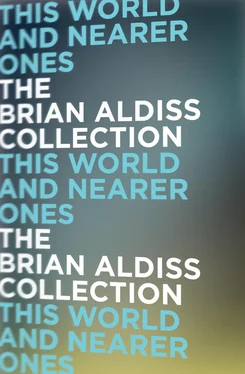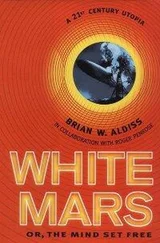1 ...6 7 8 10 11 12 ...17 ‘My post gave me a direct view of the magnificent photograph, about four by six, which was hanging over Ellen’s desk. It looked like a star caught in the act of blowing up – as, in miniature, it was; the photo was an enlargement from a cosmic-ray emulsion-trace, showing a heavy primary nucleus hitting a carbon atom in the emulsion and knocking it to bits, producing a star of fragment-traces and a shower of more than two hundred mesons.
Nobody with any sense of the drama implicit in a photograph like that – a record of the undoing of one of the basic building blocks of the universe, by a bullet that had travelled unknowable millions of years and miles to effect the catastrophe – could have resisted asking for a closer look.’
In asking for a closer look at the photograph, Julian Cole becomes involved as a journalist on the International Geophysical Year expedition to the Arctic. A member of the expedition, Joseph Wentz, dies, and a short oration is made over his dead body by Farnsworth, the leader of the expedition. The oration includes these words: ‘If You [God] … exist, and if You are still thinking about men, think of Joe Wentz. He admired Your fine workmanship in the stars, and never reproached You for spoiling him.’
Another member of the expedition responds angrily, ‘It is proven: He never punishes crime; He cares nothing for stars; why should He care about man?’ Much of Blish’s work is devoted to answering this question. Is there a God? Does he care? Can we achieve answers to these vital questions by pushing science (knowledge) to its extremes?
Juxtaposed, these questions form a central riddle, the nature of which changes slightly throughout Blish’s long career. Blish never satisfactorily answers the riddle himself. This may imply a failure as a theoretical novelist, but the riddle is often embodied in an image of great power; this is his success as a poet. The riddle is given form in Fallen Star , for instance, by the little pebble which Farnsworth embeds in an ordinary ice cube.
The pebble is a tektite fallen to Earth from the region of the asteroid belt, and consists of sedimentary rock . The implications of this find are tremendous. An asteroidal protoplanet once existed which supported oceans for a long period. So its climate must have been warmer than Mars; it must have had an atmosphere. A later discovery carries these theories further. There was life on the planet. And it was destroyed by the Martians within the period of Man’s span on Earth. There has been War in Heaven. As Farnsworth says – ‘Cosmic history in an ice cube!’
These and similar preoccupations explain why Blish felt such admiration for C. S. Lewis, to whose memory Black Easter is dedicated. Yet Blish is of what we may term the Campbell Generation; his work bears at least superficial resemblances to the other writing forged on John W. Campbell’s anvil. The Okie series, for example, gathered into book form as Cities in Flight , ran in serial form over a number of years in Campbell’s Astounding . Beneath the galactic gallivantings, however, lies something more hard-headed than anything in Heinlein, more intellectual than anything in Asimov, and more immense than anything in Van Vogt. Moreover, that something has little in common with the two SF writers Blish most admired, Henry Kuttner and Cyril Kornbluth, for he rarely attempts the romantic and satiric modes in which Kuttner and Kornbluth are most successful.
In their spirit of enquiry, Blish’s novels are centrally science fictional. It is in the direction of that enquiry that Blish’s originality lies. We can only hope that some critic will come along and investigate his whole considerable oeuvre for us, revealing Blish’s true stature. I hope to point to a few lines of enquiry in this essay.
One main topic in the Astounding to which Blish contributed his early stories may be summed up in that striking phrase of Winston Churchill’s: ‘The Stone Age may return on the gleaming wings of science.’ Campbell’s writers, whatever they might profess on the surface, were ambivalent regarding the virtues of the future world to which they saw themselves progressing as the outriders of culture. Time and time again, their stories dramatise experiments which – like those of Wernher von Braun in real life – metaphorically aim for the stars but hit London. Only in the stories of Isaac Asimov do we glimpse some kind of ordered and rational future. Yet, in the most popular of all sagas to emerge from Campbell’s forge, Asimov’s Foundation , (the title of that civilisation which Hari Seldon must preserve against the forces of decline) culture has nothing to do with the arts and humanities: it signifies merely an extrapolated twentieth-century technology which encases Trantor in metal, opposed by a barbarism which rides in spaceships.
Blish’s conception of culture and of science is more profound: he sees beneath them to their warring source. He perceived how every civilisation is dominated by a few major ideas and how these ideas become gradually outmoded, dooming the culture concerned; the fate of the Martians in Fallen Star is not that their planet has lost its atmosphere, but that they ‘have gone frozen in the brains’. Blish appreciated the seminal value of the pre-Classical culture in Greece, and dismissed out of hand Campbell’s assertion that ‘Homer was a barbarian’. Ideas infused from other sources can regenerate older cultures, as is demonstrated in Dr Mirabilis , the biography of the ‘miraculous doctor’, Roger Bacon, over which Blish laboured so long. The same seminal thought moved Blish to yoke four totally distinct books, A Case of Conscience, Black Easter, The Day After Judgement, and Mirabilis , together as an uncomfortable tetralogy entitled After Such Knowledge . His obsession with the true scientific nature of cultures is dramatised in The Seedling Stars which owes much to Olaf Stapledon. There an Adapted Man is not so much a man as an Idea from Earth, inserted into an alien environment to regenerate it (the reverse of the situation in Fallen Star ).
The Seedling Stars is ultimately crude because the grand experiment of seeding stars takes little account of the feelings of the living beings forced to participate in the experiment, despite the moralising about the venture which goes on. Blish was interested in morality as a consciousness structure, while singularly lacking conventional moral tone. Individual lives rarely moved him. What concerned him was connecting together incompatible structures; he had come to believe, through Oswald Spengler, that there were no eternal verities, not even in the mathematics which is the basis of culture; hence his pre-occupation with eschatology.
A passage in Spengler’s Decline of the West must have attracted Blish’s attention, and certainly is relevant to the present day.
‘The modern mathematic, though “true” only for the Western spirit, is undeniably a master-work of that spirit; and yet to Plato it would have seemed a ridiculous and painful aberration from the path leading to the “true” – to wit, the Classical – mathematic. And so with ourselves. Plainly, we have almost no notion of the multitude of great ideas belonging to other Cultures that we have suffered to lapse because our thought with its limitations has not permitted us to assimilate them, or (which comes to the same thing) has led us to reject them as false, superfluous, and nonsensical.’
Our culture, sensing that the numbers in the Renaissance hour-glass are running out, is now trying belatedly to derive notations from other cultures previously ignored. Hence such manifestations as Tao Physics – and possibly SF itself.
Читать дальше










